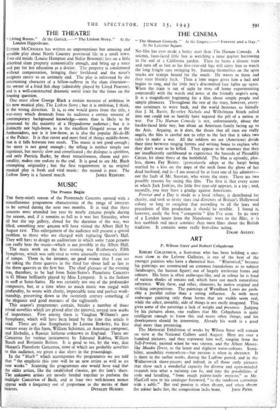MUSIC The Proms Begin
THE forty-ninth season of the Promenade Concerts opened with a miscellaneous programme characteristic of the range of interests to be served dunng the next two months. It is said that these concerts were attended last year by nearly 250,000 people during the season, and, if it remains as full as it was last Saturday, when all but the top gallery, closed for the duration of the war, was filled, something near 400,000 will have visited the Albert Hall by August 2ISL This enlargement of the audience will present a special problem to those who are charged with replacing Queen's Hall. They will have to design an auditorium in which some 7,000 persons can really hear the music—which is not possible in the Albert Hall.
The main work on the first evening was Beethoven's Fifth Symphony, which was subj:cted to some unusually erratic variations of tempo. There is, for instance, no good reason that I can see for taking the three quavers in the third bar about half as fast as the three quavers m the first bar. The chief pleasure of the evening was, therefore, to be had from Saint-Saens's Pianoforte Concerto in G Minor brilliantly played by Miss Lympany. It is the fashion to sniff at Saint-Satins. He was certainly not one of the profounder composers, but, at a time when so much music was turgid with profundity, he wrote with clarity, impeccable taste and perfect work- manship, preserving down to the twentieth century something of the elegance and good manners of the eighteenth.
This season's programmes contain, besides a number of those trivial novelties which-are played after the interval, several new works of importance. First among them is Vaughan Williams's new Symphony, which will have been heard by the time this article is read. There are also Symphonies by Lennox Berkeley, his first mature essay in this form, William Schuman. an American composer, and Shebalin, a Russian hitherto unknown in England. There are Concertos for various instruments by Edmund Rubbra, William Busch and Benjamin Britten. It is good to see, by the way, that Mozart's Pianoforte Concertos, most of which are probably novelties to this audience, are given a due share in the proceedings.
In the "blurb" which accompanies the programmes we are told that " the emphasis this year will be on new artists as well as on new works." Scanning the programmes one would have said that the older artists, like the established classics, get the lion's share. The unknown artists are mostly herded together to perform the multiple Concertos of Bach, and at least two well-known names appear with a frequency out of proportion to the merits of their






























 Previous page
Previous page